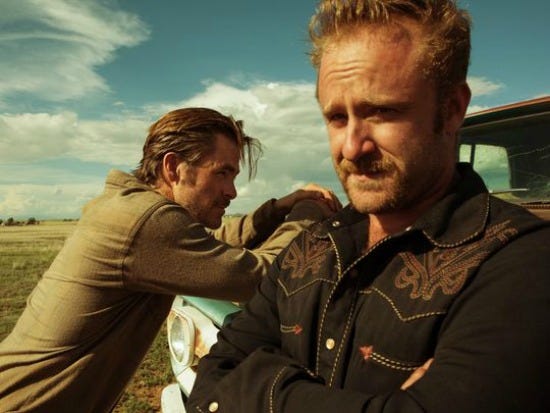Hell or High Water
Deeply moody and evocative, yet with a potboiler plot that steadily builds a head of steam, “Hell” is sharp as a leather strap cracked against bare skin in the scorching West Texas sun.
For a decade or so there’s been a thing in Hollywood called the Black List, which consists of screenplays that are greatly admired but for some reason haven’t been picked up for production. In general these tend to be smaller, more challenging stories that might not necessarily have mass appeal. The idea is to garner these languishing scripts attention so somebody will make a successful movie out of them.
Roughly one-third have been, including Best Picture Oscar winners “Argo,” “The King’s Speech,” “Spotlight” and “Slumdog Millionaire.” But there have also been many Black List flops like “Black Snake Moan,” “47 Ronin," "Our Brand Is Crisis,” etc.
“Hell or High Water,” despite that sub-par, generic-sounding title — I at first thought it had something to do with boats — belongs among any estimation of home runs.
Deeply moody and evocative, yet with a potboiler plot that steadily builds a head of steam, “Hell” is sharp as a leather strap cracked against bare skin in the scorching West Texas sun.
The film is part crime story, part throwback Western, part family reconciliation. It’s about old cowboys and young, lawmen versus bandits, the sins of bank robbers weighed against those of the bankers. It wears the long prairie duster of the Old West, as hard men wander out of the hot, flat pan and converge toward a grim reckoning.
Jeff Bridges, Chris Pine and Ben Foster each deliver some of the best performances of their careers, layered and bone-deep. They’re playing outwardly simplistic men who’ve thought about their lives and found them wanting.
Bridges is Marcus, a Texas Ranger facing mandatory retirement in a few weeks who’d like to go out in a blaze of glory rather than face the terror of sitting on his front porch with no purpose to life.
With a silver mustache, thick middle and a tendency to chew his words like cud, Marcus is a legend fading before his own eyes — probably been carrying around the same bullets in his sidearm for 15 years. He’s ornery and cussed, likes to insult the hybrid Mexican / Comanche heritage of his partner, then dismiss it as teasing.
“I don’t know how you’re going to survive without someone to outsmart,” the partner (a fine Gil Birmingham) says, giving a little back.
Pine and Foster are Toby and Tanner Howard, brothers both alike and differing in a lot of ways. Toby is reserved, thoughtful, remorseful. His marriage and job have cratered, he’s estranged from his ex-wife and teenage sons, just buried his mother after a long illness and is trying to prevent the bank from foreclosing on the family ranch.
Tanner is a career criminal who calculates he’s spent half of his adult life behind bars, a dead-ender who embraces his outlaw reputation and calls it an ethos. He never makes any plans beyond the limits of the cash in his pocket or what he can steal. He does what he does because he’s good at it and he likes it; as Marcus wryly observes, if Tanner ever got himself a big pile of money he’d probably spend it all on stupid junk just so he could have an excuse to go out and steal again.
The Howard boys are knocking over small-fry banks in tiny Texas towns, places with names like Coleman and Post, sometimes two or three a day. Too small a haul to warrant FBI attention, it’s dropped into Marcus’ lap. He makes the rounds, interviews the witnesses, is confounded by the repeated lack of video surveillance. At first bored, his old juices get flowing again. They’re just the sort of crimes that seem random and stupid, but require a smart mind to string together.
Directed by David Mackenzie (“Young Adam”) from a script by Taylor Sheridan (“Sicario”), this is the sort of movie that’s always on the move but never seems in a hurry. It takes the time to flesh out scenes and polish minor characters, like the sassy waitress who refuses to relinquish the fat tip the brothers left with (maybe) stolen money. Or the elderly cowpoke caught up in one of the robberies who, when asked if he’s armed, spits, “Of course I’ve got a gun!”
“Hell or High Water” is a taut modern masterpiece that learned its lessons well from the classics – both the tough, unruly Texas folk and the movies made about them.





